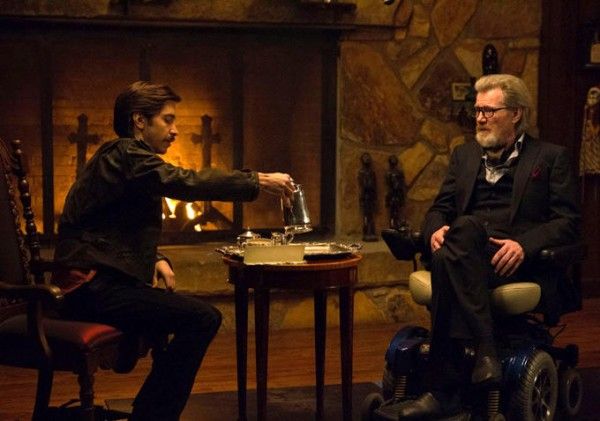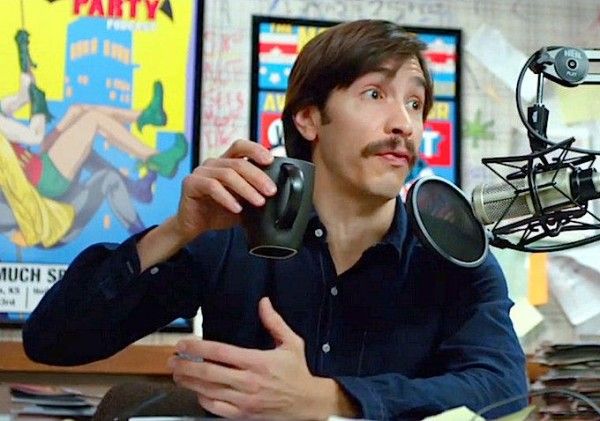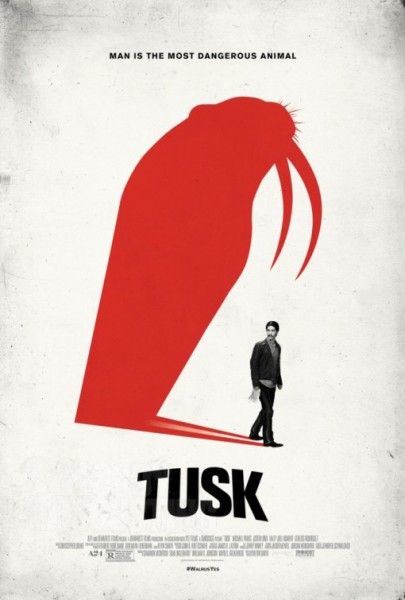For most of his career, Kevin Smith freely admitted that screenwriting—particularly dialogue—was his strong suit, but he wasn’t a tremendous director. In my review of Red State, I noted that visually, the movie was miles ahead of anything Smith had ever done, but it was hamstrung by a scattershot tone and shoddy screenwriting that was too reliant on juvenile humor. Although his follow-up, Tusk, keeps the same commendable visuals as Red State, Smith’s talent as a screenwriter has greatly declined as he descends into self-parody with conversations and monologues that go on endlessly but rarely advance the story or provide insight into the characters. Instead, his greatest passion is for his grotesque monster, a creature that looks more silly than disturbing.
Wallace Bryton (Justin Long) is a smarmy, arrogant podcaster who goes to Canada to interview a kid who sliced off his leg in a YouTube video. When that interview doesn’t pan out, Wallace goes looking for another story so his trip to Canada isn’t a waste. He sees an opportunity when he comes across a handbill, whose author offers the prospect of exciting tales, namely his adventure of being lost at sea. Wallace drives out to a spooky mansion to meet the storyteller, Howard Howe (Michael Parks). During their initial conversation, Wallace is drugged, confined to a wheelchair, and learns that Howard has a unique and disturbing obsession with walruses. He also has a plan for Wallace.
The idea for Tusk came out of one of Smith’s podcasts, a format that perfectly suits Smith at this point in his career. Smith is a good oral storyteller, but ceased to be a good filmmaker. I absolutely loved Smith’s work when I was in high school, and I think his first five films range from good to incredible. But even Smith admits that Red State is the best film he’ll ever make (I was in the audience when he said this at New York Comic-Con 2012), and that’s a bit sad considering the movie’s deep flaws. Tusk is in the same vein—elements of promising horror dragged down by some of Smith’s worst tendencies.
Commendably, he mostly ditches his reliance on juvenile humor and attempts to play it straight insofar as Wallace and Howard’s relationship. Parks plays sinister so well, and his grandiloquent character oozes malevolence. Smith also keeps an uneasy balance between his two lead characters as neither one is particularly likable, but we’re enticed by the prospect of seeing how their relationship will change since we know Wallace is in big trouble. Smith sets the goal of trying to see if we can take a total asshole like Wallace and make him sympathetic based on how he’s being treated by Howe. It’s a gamble, but it doesn’t pay off. The culmination of their relationship is too ridiculous to be upsetting, and it loses a great deal of its power when Johnny Depp enters the picture.
Depp plays Guy Lapointe, a detective who has been hunting a serial killer for years, and believes Howe is his man. There’s a sense that Smith can’t believe he got an actor of Depp’s stature, and that it would be a wasted opportunity if he didn’t give the Oscar-nominated actor plenty of monologues and extended scenes of dialogue. Depp, for his part, does what Depp does at this point in his career: play a caricature rather than a character. He gets to put on a big mustache and a goofy Québécois accent, and then just talks and talks and talks.
Even though Smith has more visual panache, his cinematic storytelling has gone to hell. It's as if he forgot how to add energy to his dialogue scenes. There’s nothing wrong with having two characters chat, but if you look at Clerks or Mallrats, there’s plenty of pop and enthusiasm that keeps the conversation lively. Looking at his dramatic work, Chasing Amy has its fair share of monologues, but Smith had the confidence to hold the shot and cut sparingly. Holden’s confessing his love to Alyssa rarely cuts to her face, which is good because it keeps the emphasis on his words. Tusk flips between one-shots and masters seemingly at random with straight-ahead shots thrown in for some reason.
Smith had the elements he wanted: A weird story, a walrus, a podcaster, Parks, and Depp, but the filmmaker’s weaknesses have become too glaring and his skill as a filmmaker has decreased drastically. The movie has some oddly sweet moments and Michael Parks can make Kevin Smith’s dialogue sing, but Tusk, much like its monster, is a bunch of parts crudely stitched together into something resembling its intended design.
Rating: D+





